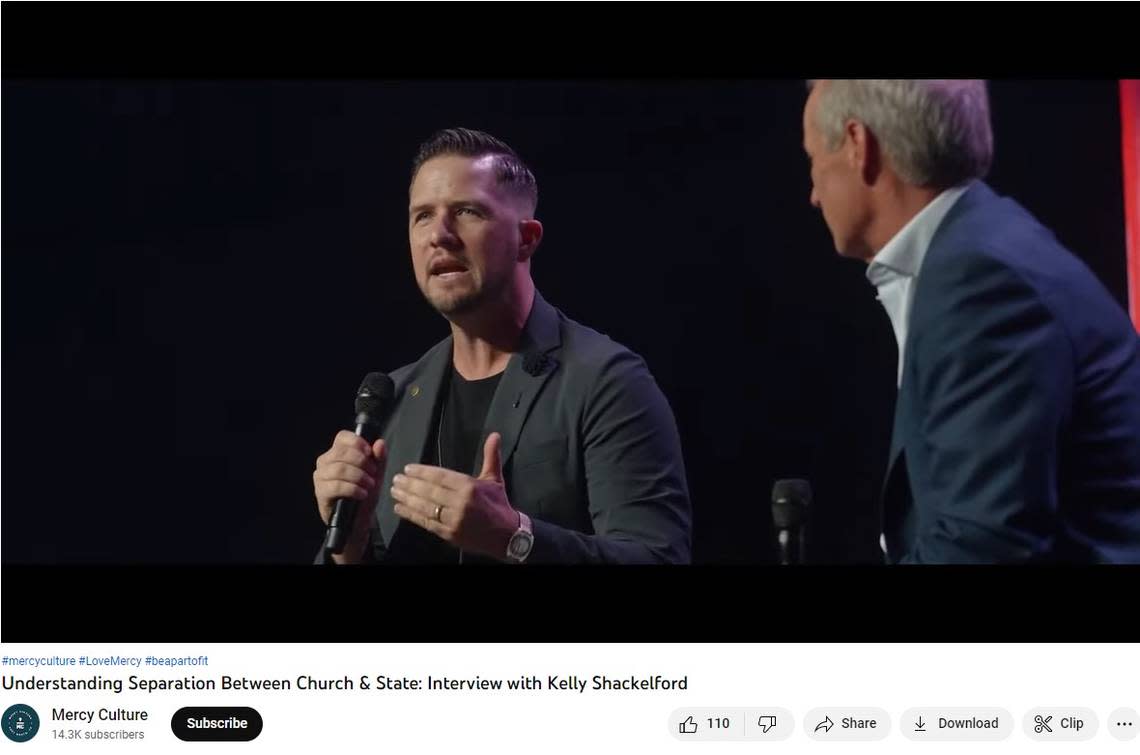God is not a Republican or Democrat. Pastors don’t need to endorse political candidates
The senior lead pastor of Mercy Culture Church in Fort Worth, Landon Schott, recently endorsed two Tarrant County candidates and encouraged other pastors to be more vocal about politics. In fact, Schott was so bold about it that he directly challenged the IRS to revoke his church’s tax-exempt status for doing so.
This is common in Texas: A November Texas Tribune and ProPublica report found that about 20 churches endorsed candidates in apparent violation of federal tax law over the last two years.
I’m sure there are greater white-collar crimes the IRS needs to be made aware of than a church violating its tax-exempt status. That said, church leadership should be model citizens. “Render under Caesar, that which is Caesar’s,” is a little thing Jesus said.
To that end, church leaders have two choices when it comes to elections: Give up their tax-exempt status and endorse candidates during services or abstain from breaking the law and keep it. They can’t — and shouldn’t — do both. Here’s why.

Evangelicals have been mixing with modern day politics since Jerry Falwell founded the Moral Majority in 1979. Indeed, Christians and politics have mingled from the birth of Christ and Herod’s call to murder young boys, to Henry VIII’s love life, which fueled the bitter divide between Catholics and Protestants.
Some pastors, particularly in the South or Southwest, endorse politicians because they think Christians are commanded to be involved in politics, particularly, as voters. This is true to an extent. Jesus encouraged his followers to do only one thing: to love the Lord their God and to love their neighbor as they love themselves. The Christian duty can be summated in Micah 6:8: “What does the Lord require of you? To do justice, to love mercy, and to walk humbly with your God.”
Peter, an apostle of Jesus, wrote about Christians and their relationship to the government with this simple command: “Honor all men. Love the brotherhood. Fear God. Honor the king” (1 Peter 2: 17).
Of course, sometimes Christians must ask themselves if verses like this apply to a government that is corrupt, murderous or totalitarian. Pastors in 1940s Germany surely faced this dilemma. America before the end of Roe v. Wade faced this question. But American pastors do not find themselves in a dictatorship but in a free country — often wrong, but one that values liberty nonetheless.
Therefore, blatantly violating U.S. law, especially in the name of name-dropping politicians is not only wrong but honestly, a bit silly.
Christians do not need to be hand-fed candidates for whom to vote as if their civic duty is synonymous with obeying God. I’m sorry to break this news to anyone who may be offended, but God is not a Republican or a Democrat.
In Jesus’ 33 years on earth, he dedicated himself to the poor, the ill, the widows, the fatherless, the underserved and the underrepresented. If he were to walk the streets of America today, where would we find him? With the Housewives of Beverly Hills? Or with the drug addicts peppering the streets of San Francisco? At the White House, or in an orphanage?
Jesus showed disdain for hypocrites who used religion as a ruse, and there’s no doubt he would have hated politicians who wash their hands from difficult situations because they’re unable or unwilling to do what is right and thus sacrifice their position of power.
If pastors want to talk about ideas, about how to help people process policies that affect the poor, the ill, the widows, and the fatherless, they should do so. Neither political party consistently supports policies that offer the scaffolding these groups need to survive.
I’d argue Republicans do more than Democrats, because a model of government that supports lower taxes, personal responsibility and a free market tends to help everyone more, even the poor. But many pastors today would encourage their congregations to vote for Democrats because they typically increase health and welfare benefits through policies.
Either way, Christians should be able to decide whether certain politicians reflect Jesus’ commands. They don’t need a pastor to do it for them.
In his sermon, Schott told his congregation. “There’s this, almost like, this scare tactic, this intimidation thing that comes to try to keep people afraid, and if there’s any pastors that are watching or watch the livestream, what you’re really talking about is the potential of losing your 501(c)(3). Big whoop.” Schott’s got it wrong here. It’s not a scare tactic. It’s the law.
Pastors, above all, should abide by them. It’s not an act of defiance or cool rebellion to endorse candidates. If it’s not a big deal and Schott doesn’t want to follow the law, instead of baiting the IRS, by all means, drop their nonprofit status voluntarily and pay their taxes accordingly.
My guess is their congregations will still vote the same either way. Christians should definitely be involved in politics at all levels at all times, because politics is one means to help people. But they shouldn’t need their pastor to tell them how to vote.
